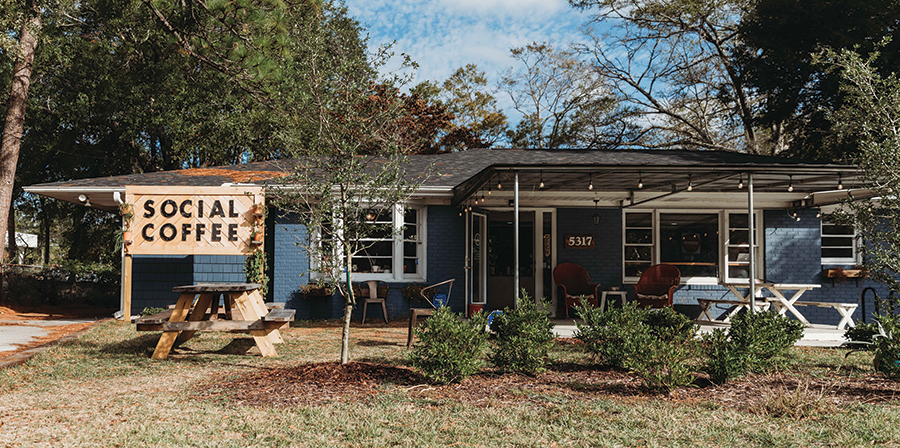The Long Road to Overnight Success
From poet to publisher, Emily Smith makes her mark with Lookout Books
By Wiley Cash • Photographs by Mallory Cash
I first met Emily Smith in September 2010 at the annual conference of the Southern Independent Booksellers’ Alliance in Charleston, South Carolina. She was there with a Spartanburg publisher called Hub City Books, which was releasing a poetry collection by Ron Rash. Emily had designed the collection’s cover. A year later, I saw Emily again, but this time I saw her photograph online: She was attending an awards dinner in New York City, where a book she had published was a finalist for the National Book Award in fiction. A lot had happened in the intervening year.
The book Emily had published was Binocular Vision: New and Selected Stories, by Edith Pearlman, a short story writer in her 70s who had long been a favorite of the literati, while never breaking through to a larger, critical audience. Pearlman’s book was the first to be released by Lookout Books, a publishing imprint housed in the Publishing Laboratory inside the University of North Carolina Wilmington’s creative writing department. Emily, along with editor emeritus Ben George, published Pearlman’s book as Lookout’s first release. The book would go on to be nominated for a number of prizes, and it would later win the National Book Critics Circle Award. It was quite the debut for a small press. Publishers Weekly called it a “knockout start,” and Ron Charles of The Washington Post praised Lookout’s release as “one of the most auspicious publishing launches in history.”
There are centuries-old publishing houses in New York City that would kill for a single season’s title to receive the acclaim that Binocular Vision received, but there are simply too many bottles and not enough lightning. Or perhaps there is only one Emily Smith, and her journey from advertising executive to publisher of acclaimed books is perhaps as rare as the aforementioned glass-encased lightning.
In early November, Emily took a break from promoting the most recent Lookout title, This Is My Body: A Memoir of Religious and Romantic Obsession, by Cameron Dezen Hammon, to sit down with me over coffee at Social Coffee and Supply Co. on Wrightsville Avenue in Wilmington. It was a cool fall morning, and Emily and I found seats by the bright windows just inside the front door. Our conversation turned toward the first time we met in Charleston back in the fall of 2010.
“I’d gotten to know the folks at Hub City because I was their inaugural writer-in-residence,” she says. “I went there as a poet, but part of the residency had me working 20 hours per week for the press.”
“What were you doing before that?” I ask.
“I’d been a graduate student at UNC Wilmington,” she says, “and I’d worked in the Publishing Laboratory here, which I now run.”

But her experience in design and marketing, as well as her ability to network and build relationships, predates her time as a graduate student in Wilmington and writer-in-residence in Spartanburg. After finishing her undergraduate degree at Davidson, Emily spent several years in advertising at J. Walter Thompson in Atlanta. “We worked with big clients,” she says. “Ford Motor Company, 20th Century Fox, Domino’s Pizza. But I burned out. I knew it wasn’t what I wanted to do.”
She left Atlanta and returned to Davidson, where she worked in the Advancement office, forging relationships with alumni and the community, and raising money for the university. But something was steering her toward writing, and she enrolled as a poetry student in the MFA program at UNC Wilmington. After finishing her degree and serving as the writer-in-residence at Hub City in Spartanburg, she returned to Wilmington as the interim director of the Publishing Laboratory in 2007.
In her role as interim director, Emily found a distributor to ensure that the Publishing Lab’s titles were sold beyond the campus and outside of Wilmington. When a national search began for the permanent director, Emily decided to apply. “I thought, it would be silly not to try for this after doing this job for a year,” she says. She got the job and forged a dynamic partnership with Ben George, who at the time served as editor of Ecotone, the university’s national literary magazine. The two joined forces to found Lookout Books, which they envisioned as a literary imprint dedicated to publishing women, debut writers, and overlooked work by established authors.
“Ben came to UNCW with a reputation as a meticulous, thoughtful editor,” Emily says. “And I knew the other side of the business. I had an advertising and marketing background. I knew the design part from working at Hub City. I knew how to work as a small press and handle distribution.”
After the success of Edith Pearlman’s Binocular Vision, Lookout Books quickly garnered national attention, and the press has consistently delivered critically acclaimed and award-winning books by both established and debut authors.
I ask Emily about the press’s current release, This Is My Body, by Cameron Dezen Hammon. “It’s the story of someone who grew up culturally Jewish and then converted to evangelical Christianity post-9/11,” she says. “9/11 was a time in which everyone and everything felt spiritual, and Cameron was caught up in it. She converted and moved with her musician boyfriend to Houston, where they performed music at an evangelical church.” The longer she stayed in the church the more she found herself caught up in a misogynistic culture that limited her to a gender role that defined both her faith and spiritual talents. “It’s a story of seeking something and discovering something else,” Emily says.
I cannot help but think about Emily doing the same, setting out on a search that took her from advertising executive in Atlanta to graduate student in Wilmington to writer-in-residence in Spartanburg and back to Wilmington, where she would publish titles that would make Lookout Books an overnight literary sensation.
Wiley Cash lives in Wilmington with his wife and their two daughters. His latest novel, The Last Ballad, is available wherever books are sold.


